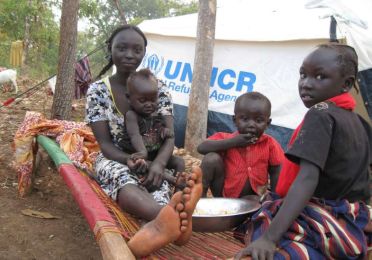Hundreds flee Sudan and South Sudan border areas
By Julius N. Uma
April 2, 2012 (JUBA) – Recent clashes either side of the Sudan and South Sudan border have displaced over 400 people, with more expected, while about 80 people have been injured and admitted to hospital in Unity State and Juba.

“The security situation along the border with Sudan deteriorated sharply over the week, with reports of aerial and ground attacks on 26 and 27 March in the Tishwin and Higlig areas,” UNOCHA notes in the 23-29 March report, adding that plans are underway to conduct a rapid inter-agency assessment in coming days to determine needs and required response of displaced people.
Ban Ki-moon, the UN Secretary-General on Monday expressed deep concerns over the continued fighting along the border, and reiterated the call for both governments to immediately cease hostilities and implement the agreements already reached on security, border monitoring and Abyei.
South Sudan leader, Salva Kiir was due to meet his Sudanese counterpart, Omar Hassan al-Bashir for a presidential summit earlier scheduled for 3 April in Juba but Khartoum cancelled the visit after the fighting.
On 27 March the UN Security Council also issued a press statement calling on the governments of Sudan and South Sudan to exercise maximum restraint and sustain purposeful dialogue in order to address peacefully the issues that are fuelling mistrust between the two countries. As well as border dispute agreements are yet to be signed on how much Juba will pay Khartoum in oil transit fees, citizenship, national debt and the Abyei region which is claimed by both countries.
Meanwhile, UN refugee agency (UNHCR) also expressed serious concerns that the recurrent fighting in disputed areas along the border limits the safety for refugees in the nearby Yida in Unity State, which has been bombed by SAF on more than one occasion. The recent clashes may not have affected the refugees, but their welfare and security remains a big concern, the agency said.
As of 29 March, more than 85,000 refugees have reportedly been registered due to the massive influx of people fleeing the fighting in Blue Nile into South Sudan’s Upper Nile State. Over 49,000 of them are stationed in Doro, while the about 36,000 people in Jammam refugee camp.
On the situation in Jonglei, UNOCHA says the ongoing disarmament has greatly been hampered by some Murle and Lou Nuer communities resisting the exercise. As such, humanitarian partners are reportedly concerned that clashes may break out when the Murle meet with the Lou Nuer youths, as both sides are still armed.
Also noted is the unexpected increase in food prices, currently seen as the driving force behind rising food insecurity fears, exacerbated by localised conflict. According to UNOCHA, results from February 2012 round of the food security monitoring system show a deterioration in food security from October 2011 in the South Sudan’s northern states of Western Bahr el Ghazal, Warrap and Unity.
“The food insecure households in the country remain at 50 percent, or about 4.7 million people,” the report says, while Western Bahr el Ghazal, Northern Bahr el Ghazal, Warrap, Jonglei and Unity are the most food insecure states in the world’s newest nation.
(ST)
